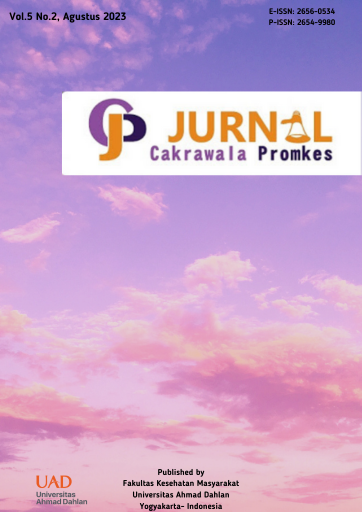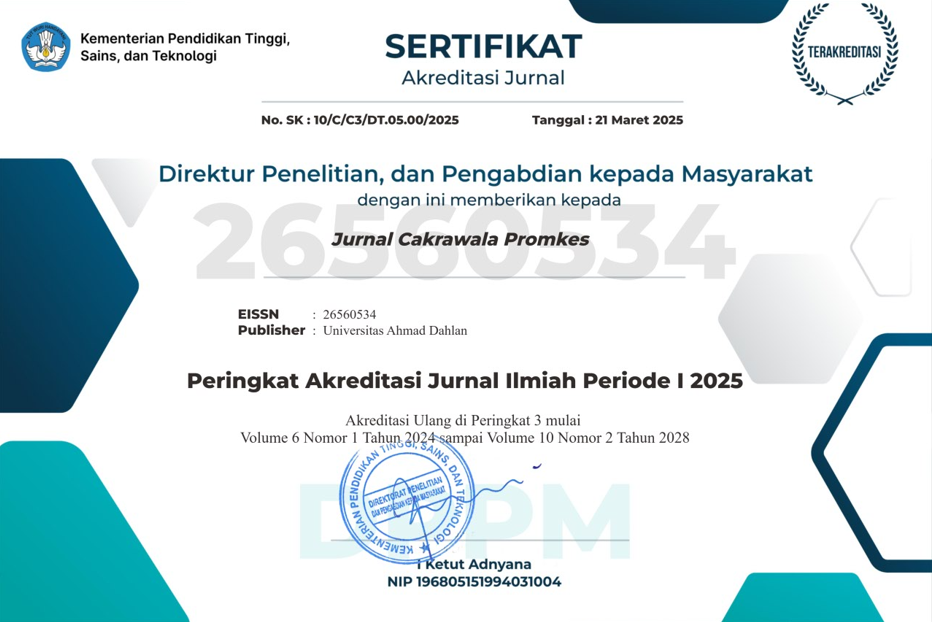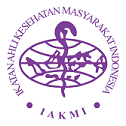Increasing mothers' reproductive health knowledge and attitudes through education on youth internet-based social interaction
DOI:
https://doi.org/10.12928/promkes.v5i2.7664Keywords:
Adolescent, Internet, Mother, Reproductive health, Social InteractionAbstract
Adolescents have the highest rate of internet usage compared to those of different ages. Dissertation media, societal changes, and insufficient parental involvement support the development of promiscuity in adolescents. Parents, especially mothers, have a strong role in controlling the behavior of adolescents. Therefore, mothers need to have good knowledge and attitudes related to youth internet-based social interaction. The goal of this study is to assess changes in mothers' attitudes and knowledge because of education regarding how young people engage online and how that affects their reproductive health. Forms of adolescent sexual behavior, pornography, adolescent self-concept, cyberbullying, and parent-adolescent communication are among the knowledge and attitude topics that are evaluated. In this study, a one-group, quasi-experimental pretest-posttest approach was adopted. The research sample consists of 21 participants that were chosen using purposive sampling. A paired t-test was utilized to assess the questionnaire data. In the pre- and post-test, the respondents’ average knowledge score rose from 95.23 to 97.14. P value of 0.428 (95% CI: 3.00–6.61). Respondents’ attitude score rose from 77.85 to 85.95 (95% CI: 1.56–14.63). These results indicated differences in the respondents’ attitudes before and after training but not in their knowledge, although both of them experienced an increase in average scores. Youth internet-based social interaction for mothers can improve mothers’ attitudes and knowledge. To avoid juvenile delinquency, a health program that involves parental involvement in disseminating information about reproductive health in connection to teenage social interaction is necessary.
References
Yusuf RI, Hamdi A. Efek Interaksi Penggunaan Media Sosial dan Pengetahuan Kesehatan Reproduksi terhadap Perilaku Seksual Beresiko Remaja The Interaction Effect of Social Media Use and Reproductive Health Knowledge on Adolescent Sexual Risky Sexual Behavior. Jurnal_Pekommas. 2021;2(3):35–46.
Budiyati GA, Purwaningrum N, ’Adawiyah Y, Saifudin IMMY. Characteristics and Addiction of Gadget Inadolescent During The Covid-19 Pandemic. J Penelit Perawat Prof. 2021;3(4):829–36.
Shofiyah. Dampak Media Sosial dan Pornografi Terhadap Perilaku Seks Bebas Anak di Bawah Umur. Alamtara J Komun dan Penyiaran Islam. 2020;4(1):57–68.
Taufik A, Apendi T. Analisis Dampak Negatif Pergaulan Anak Remaja di Era Globalisasi Dengan Kemajuan Teknologi. WACANA Akad Maj Ilm Kependidikan. 2021;5(1):26.
Suhaida S, Hos HJ, Upe A. PERGAULAN BEBAS DI KALANGAN PELAJAR (Studi Kasus di Desa Masaloka Kecamatan Kepulauan Masaloka Raya Kabupaten Bomabana). Neo Soc. 2018;3(2):425–32.
BKKBN, BPS, Kemenkes RI. Survei Demografi dan Kesehatan 2017. Usaid. Jakarta; 2018.
Badan Kependudukan Keluarga Berencana Nasional. Pengelolaan Bina Keluarga Remaja (BKR). 2012 p. 1–74.
LESTARI EG, HUMAEDI S, SANTOSO MB, HASANAH D. Peran Keluarga Dalam Menanggulangi Kenakalan Remaja. Pros Penelit dan Pengabdi Kpd Masy. 2017;4(2).
Zahrok S, Suarmini NW. Peran Perempuan Dalam Keluarga. IPTEK J Proc Ser. 2018;0(5):61.
Matahari R, Isni K, Utami FP. Pemberdayaan Kesehatan Reproduksi Remaja Anggota Bina Keluarga Remaja (BKR) melalui Participatory Rural Appraisal (PRA) di Desa Potorono, Kabupaten Bantul, Daerah Istimewa Yogyakarta. Engagem J Pengabdi Kpd Masy. 2021;5(1):196–206.
Safita R. Peranan orang tua dalam memberikan pendidikan seksual pada anak. Edu Bio J. 2013;4:32–40.
RASYID PS, CLAUDIA JG, PODUNGGE Y. Pengaruh Penggunaan Gadget Terhadap Perilaku Seks Remaja. JIDAN (Jurnal Ilm Bidan). 2020;7(2):52–7.
Chasanah AM, Kilis G. Adolescents’ Gadget Addiction and Family Functioning. 2018;139(Uipsur 2017):350–8.
Utami FP. Praktik Orang Tua dalam Pengawasan Pergaulan Remaja Guna Mencegah Kehamilan Tidak Diinginkan (KTD). Care J Ilm Ilmu Kesehat. 2019;7(2):7–15.
Bastien S, Kajula LJ, Muhwezi WW. A review of studies of parent-child communication about sexuality and HIV / AIDS in sub-Saharan Africa. 2011;1–17.
Esantsi, Selina F; Onyango, Francis; Asare, Gloria J Quansah; Kuffour, Emmanuel O; Tapsoba, Placide; Birugi, Hariet; Askew I. EVIDENCE Are parents talking to adolescents about sexuality ? Evidence from four slums in Ghana “STEP UP Evidence Brief.” Accra; 2015.
Sariyani MD, Ariyanti KS, Duarsa DP, Mutmainah NF. The Relationship Between Self Efficacy and Mother’s Experience in Assisting Adolescents Using Gadgets. Nurs Heal Sci J. 2022;2(3):274–9.
Meilani N, Shaluhiyah Z, Suryoputro A. Perilaku Ibu dalam Memberikan Pendidikan Seksualitas pada Remaja Awal. Kesmas Natl Public Heal J. 2014;8(8):411.
Oo, Yin Thet Nu; Zaw Ko Ko; Than, Kyu Kyu; Mg, Mg The; Mar, Kyi Kyi; Aye SS. Do parents and adolescents talk about reproductive health ? Myanmar adolescents ’ perspective. South East Asia J Public Heal. 2011;1(5):40–5.
Alonso-Stuyck P. Parenting and healthy teenage lifestyles. Int J Environ Res Public Health. 2020;17(15):1–15.
Downloads
Published
Issue
Section
License
Copyright (c) 2023 Fitriana Putri Utami, Nur Syarianingsih Syam, Desi Nurfita

This work is licensed under a Creative Commons Attribution-ShareAlike 4.0 International License.
Authors who publish with JCP: Jurnal Cakrawala Promkes agree to the following terms:
- Authors retain copyright and grant the journal the right of first publication with the work simultaneously licensed under a Creative Commons Attribution License (CC BY-SA 4.0) that allows others to share the work with an acknowledgement of the work's authorship and initial publication in this journal.
- Authors are able to enter into separate, additional contractual arrangements for the non-exclusive distribution of the journal's published version of the work (e.g., post it to an institutional repository or publish it in a book), with an acknowledgement of its initial publication in this journal.
- Authors are permitted and encouraged to post their work online (e.g., in institutional repositories or on their website) prior to and during the submission process, as it can lead to productive exchanges, as well as earlier and greater citation of published work.

This work is licensed under a Creative Commons Attribution-ShareAlike 4.0 International License












